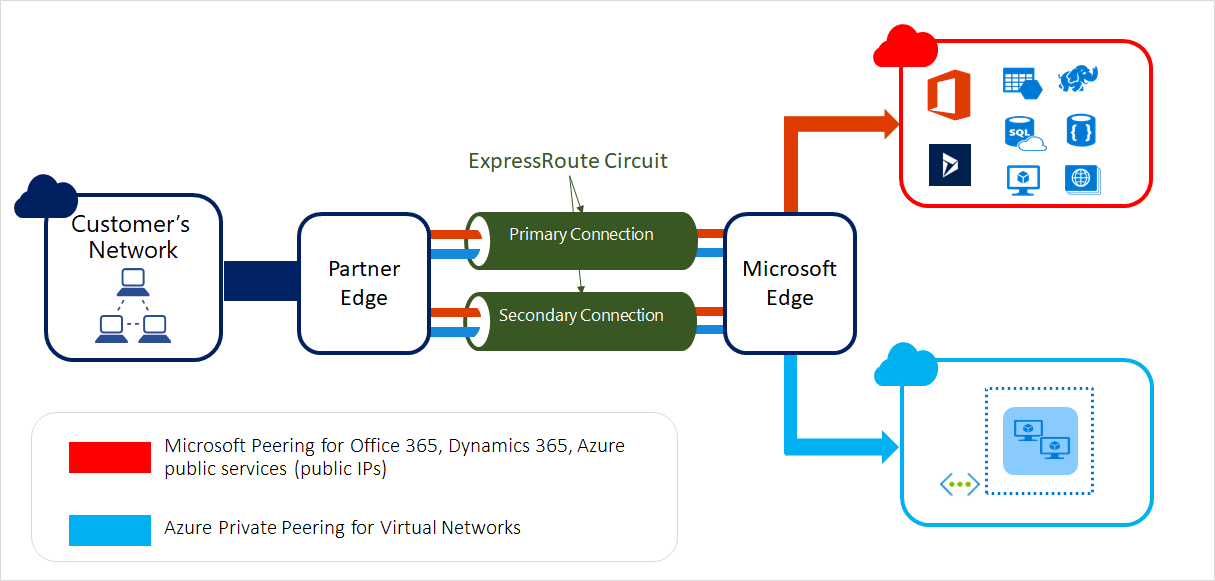What is Azure ExpressRoute? — Introduction to Azure ExpressRoute

Azure ExpressRoute lets you seamlessly extend your on-premises networks into the Microsoft Azure. This connection between your organization and Azure is dedicated and private.
ExpressRoute Key points
- ExpressRoute is a private connection from your on-premises infrastructure to your Azure infrastructure. Your data doesn’t travel over the public internet.
- Connection between your organization and Azure is dedicated.
- Security is enhanced, connections are more reliable, latency is minimal, and throughput is greatly increased.
- Connectivity to Microsoft cloud services: You can establish connections to Microsoft cloud services, such as Microsoft Azure and Microsoft 365.
- Dynamic routing:ExpressRoute uses the Border Gateway Protocol (BGP) routing protocol. This protocol enables dynamic routing between your on-premises network and services running in the Microsoft cloud.
- Layer 3 connectivity: ExpressRoute provides Layer 3 (address-level) connectivity between your on-premises network and the Microsoft cloud through connectivity partners. These connections can be from a point-to-point, any-to-any network, or they can be virtual cross-connections through an exchange.
ExpressRoute Benefits
Predictable performance: Having a dedicated connection to the Microsoft cloud guarantees performance. There are no concerns over internet provider outages or spikes in internet traffic. Your providers are accountable to provide the necessary throughput and latency SLA.
Security considerations: Your data doesn’t travel over the public internet, so it’s not exposed to the potential risks associated with internet communications.
High-throughput, low-latency connections: You can obtain speeds of up to 10 Gbps when connecting to the Microsoft cloud. If you’re using ExpressRoute Direct, you can achieve up to 100 Gbps. Latency is minimal, so your systems are highly responsive.
Availability and connectivity: Microsoft guarantees a minimum of 99.95 percent availability for an ExpressRoute dedicated circuit.
Built-in redundancy: Each connectivity provider uses redundant devices to ensure that connections established with Microsoft are highly available. You can configure multiple circuits to complement this feature. All redundant connections are configured with Layer 3 connectivity to meet SLAs.
ExpressRoute Global Reach connectivity: You can enable ExpressRoute Global Reach to exchange data across your on-premises sites by connecting your ExpressRoute circuits.
Data privacy for your traffic: Traffic that’s sent over ExpressRoute connection is as secure as using MPLS WAN links. There’s no risk of internet monitoring or packet capture by malicious users.
ExpressRoute Use Cases
- Situations where data should not traverse over the public internet for security reasons.
- Low-latency connectivity to services in the cloud.
- Accessing high-volume systems in the cloud that consume or produce massive volumes of data quickly. ExpressRoute can move data around rapidly, with high reliability.
- Consuming Microsoft Cloud Services, such as Office 365 and Dynamics 365. ExpressRoute is especially useful if your organization has a large number of users who need to access these services concurrently.
- Organizations that have migrated large-scale on-premises systems to Azure. Using ExpressRoute helps ensure that the results of the migrations are seamless for on-premises clients.
- Large datacenters, with a high number of users and systems accessing SaaS offerings.
Alternatives to ExpressRoute
- Site-to-site VPN
- Point-to-site VPN
Got a project that needs expert IT support?
From Linux and Microsoft Server to VMware, networking, and more, our team at CR Tech is here to help.
Get personalized support today and ensure your systems are running at peak performance or make sure that your project turns out to be a successful one!
CONTACT US NOW

